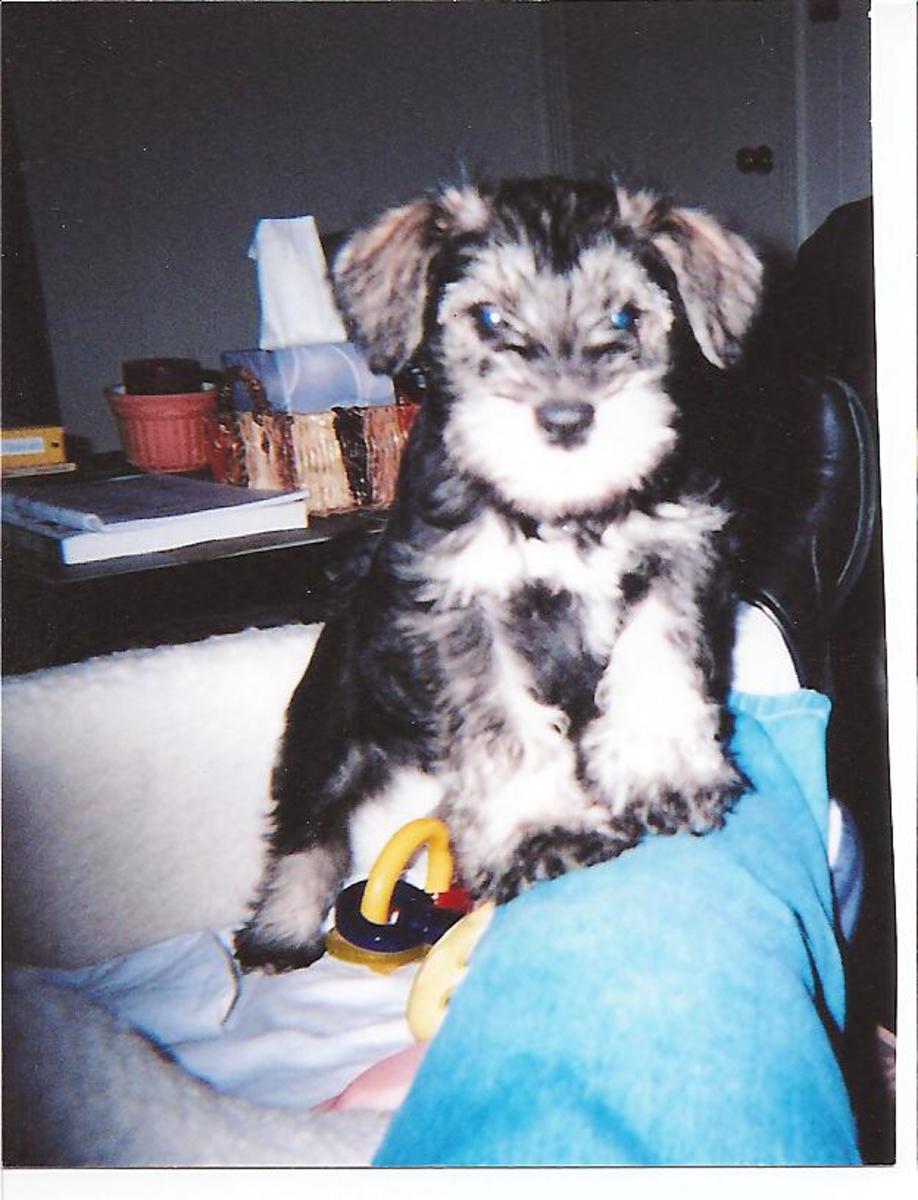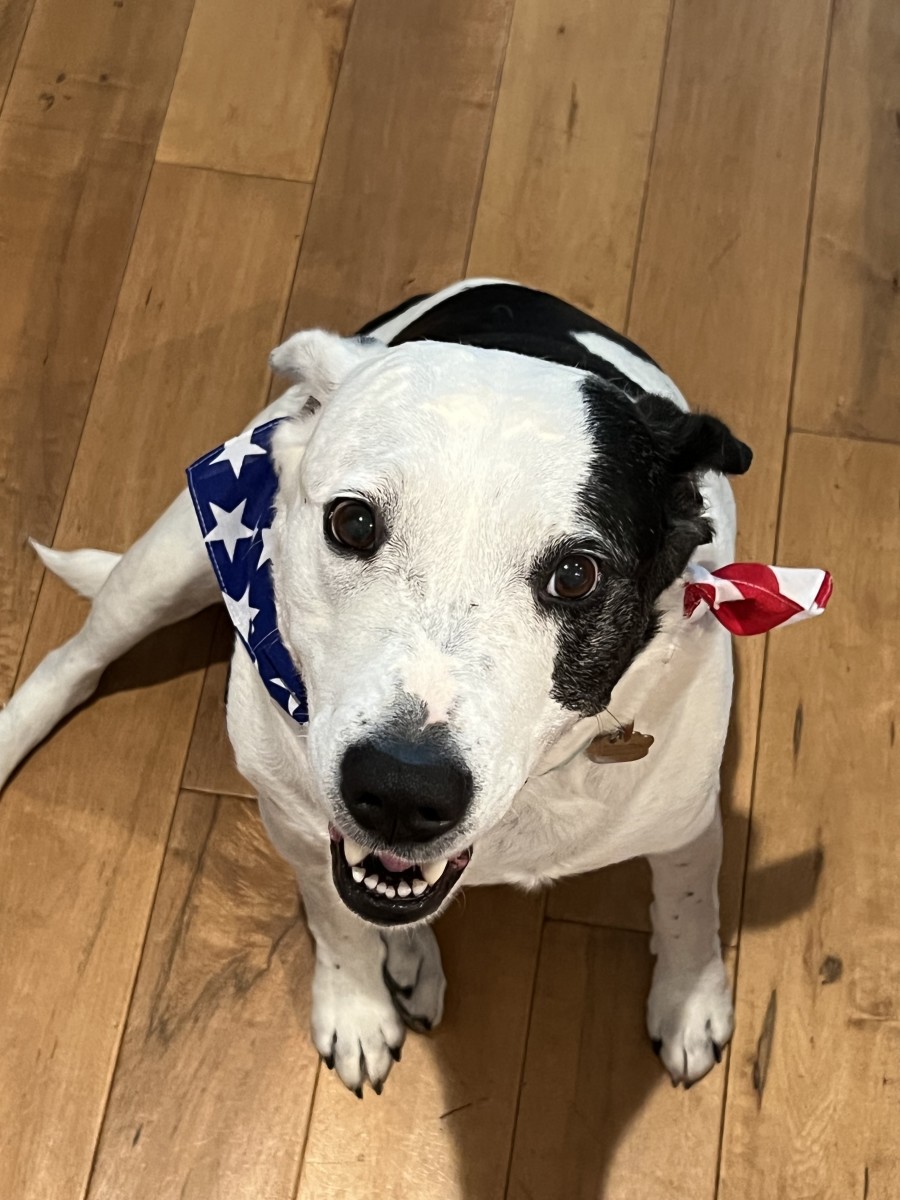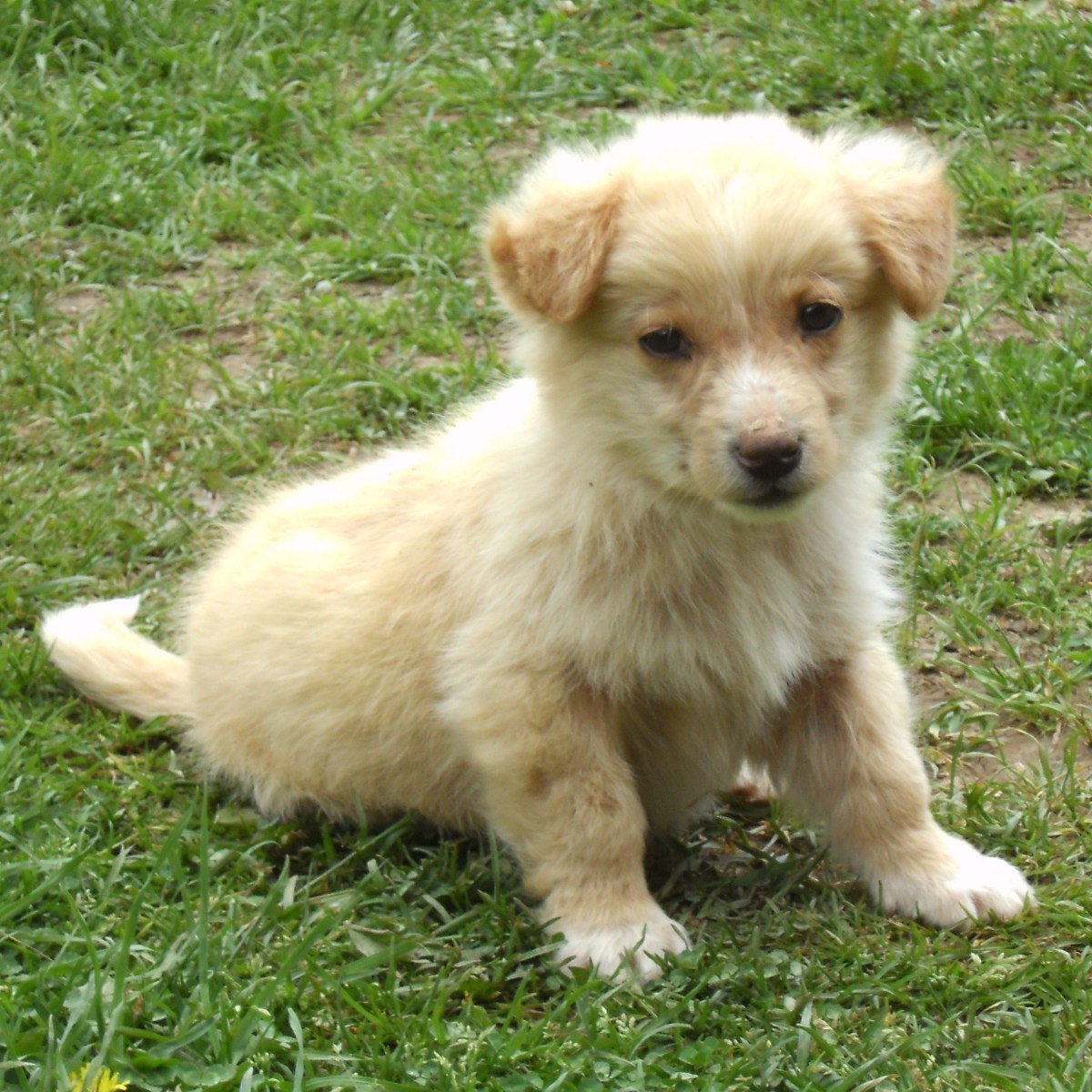The Perfect Dog
There's a saying that employees never look as good as they do on the day before they show up for their first day of work.
The same can be said about The Perfect Dog.
The Perfect Dog is that mythical being that we dream of when we're thinking of getting a dog. It comes to us housebroken and never pees on our new carpet. It's well-mannered and doesn't chew our antique furniture or steal our socks. It sleeps nicely in its bed at night and stays out of mud puddles when we turn it outdoors. Its coat always smells fresh and is soft, even when we forget to brush or bathe it. The Perfect Dog barks rarely, and only when it's protecting us or our loved ones. It understands our commands instantly and only wants to please us. It plays gently with children and never pulls on its leash or growls at other dogs. And it never, never rolls in, or worse, eats unmentionable things.
And so with visions of the hours of pleasure our Perfect Dog will give us, we set out to find it. Even though hundreds, maybe even thousands of experts warn people not to buy puppies from pet stores, facts are that's where 7 out of 10 people in the U.S. find their Perfect Puppy.
Then they bring the puppy home, and the first thing that cuddly bundle of joy does is pee on the floor. While you're cleaning that up, it disappears. You find it soon after, merrily munching "tootsie rolls" that it's found in the cat's litter box. You chase puppy out of the room and put the litter box up on a table, hoping the cat won't be offended. When you come out, you discover that your Perfect Puppy has deposited some tootsie rolls of its own in the kitchen, and is now eating them. Its stool being a little soft, its bottom is dirty and it smells like poop at both ends.
You carry your furry little beast to the bathroom and wash off its bottom and scrub its mouth with a washcloth. When you put it down, it discovers the cat and starts barking at it nonstop. You take the horrid little animal outside and tell the kids to watch it while you go back in the house to clean up the mess in the kitchen. It isn't long until you hear a scream from the backyard. You go running to see what's happened. "He bit me!" your daughter says. And indeed, the snappy little monster is jumping up on her, snapping at her sleeve.
You go grab him, only able to catch him after a few irritating minutes of playing "keep away," and carry him roughly into the house where you shut him in the bathroom while you tend to your daughter's wound (only a scratch from those sharp puppy teeth actually, but still a wound) and then go back to the kitchen to finish cleaning the floor. All the while, puppy is crying in the bathroom and scratching at the door. You ignore him as you wonder if the pet store gives refunds.
By the time you've gotten everything under control, the puppy has quieted down and you are starting to feel a little guilty about how roughly you treated him. You open the bathroom door and he looks up at you with those eyes. You know-the ones that say, "That's okay. I think YOU'RE wonderful." And your heart melts and you pick him up and give him a hug.
I wish I could say that this is the happy ending of the Perfect Puppy story. Unfortunately, it's not. The Perfect Puppy myth will soon be shattered as days go by. Puppy will cry at night and keep you up when you have an important presentation to make at work the next day. Puppy will throw up on your rug, and piddle on your floor. There will come a time that you think that he'll never be housebroken. Your kids will lose interest in him, and as he grows, he may not become the Perfect Dog you'd envision lying at your feet in the evening. He'll become a burden demands attention and lunges at the leash when you try to take him for a walk. Instead of lying at your feet, he'll want to lie across your lap-all 75 pounds of him.
And it could be even worse. He could develop serious health problems that will cost thousands of dollars to treat. His temperament could be so poor that he can't be trusted even around his own family. Instead of giving you the joy you dreamt of, he could become a serious liability in your life.
Does all of this mean that you shouldn't get a dog? No. Does it mean that all dogs are disappointments? Not at all.
It means that before you get a dog, you need to inform yourself and have realistic expectations.
Dogs are thinking, feeling beings. They can be messy and find joy in things that baffle us humans. They throw up. They eliminate. They get dirty. They have needs and they depend upon you to see that those needs are fulfilled.
Because of all of this, getting a dog is a decision that should never be taken lightly.
To help you find YOUR perfect dog, you need to take the time to educate yourself and reflect upon your lifestyle and expectations. Here are some questions that you should ask yourself when you're considering getting a dog:
1. Why do I want a dog?
One bad reason that people sometimes want a dog is because they see one in a movie or on TV and want one just like it. Dogs that are used in movies and TV shows are highly trained dogs. The Jack Russell Terrier on Frasier probably acts a lot different than a JRT that you would bring to your own home.
Another bad reason to get a dog is to make it an accessory, such as movie starts do with their small pooches. Dogs aren't accessories that can be taken off the shelf and used only when convenient. They have ongoing needs that must be attended to, like getting adequate exercise and attention.
It's also a bad idea to get a dog because your child wants one. Of course, this depends on the age of the child, but unless you're willing and able to take over the care of the puppy if the child loses interest in it, do yourself and the puppy a favor and get your child a new computer toy instead.
Examine your own reasons for wanting to get a dog. Understanding what you hope to get out of the relationship can help you make a better choice of what kind of dog to get.
2. Am I willing to take responsibility for making my dog well-behaved?
If you have children, you know that you have to invest the time and energy to make them be well-mannered, social members of the family and community. While some of the challenges involved in training a dog are different (for example, teaching them not to indulge their natural instincts to chew on things, roll in animal droppings, mount and fight with other dogs), the commitment you have to make to their training is the same as that you would commit to training your children to be well-behaved. You can train your dog not to do things that are objectionable, but it takes time and persistence.
On the plus side, aside from a short phase that some dogs go through (to be discussed in another article), your dog won't rebel or talk back to you after it's learned what you want it to do. He'll always want to please you.
3. What kind of dog should I get?
There are those who say a dog is a dog is a dog--that if you want a dog, any will do. I disagree. Temperament is an inherited characteristic in dogs. A terrier breed will have a different personality (and needs) than, say, a St. Bernard. Many of the traits in purebred dogs in particular have been ‘bred into" the dog, and while all dogs are different, dogs of specific breeds tend to share certain characteristics. Learn about the breeds of dogs that you're most interested in, and then you won't be surprised if the Border Collie you decided to get starts using its herding instincts to "round up" your kids, or the German Shepherd you got defends your property from the meter reader. Look at your lifestyle and how you want your dog to fit into that, then learn as much as possible about the breed before you go to pick out a puppy.
4. Should I get a purebred dog or rescue a dog from a shelter?
With the number of dogs in shelters and rescues, there are many who think that it's a very bad thing for people to get a purebred dog from a breeder. While I agree that many dogs that are in shelters and rescues can make wonderful pets, it's also true that many of them--even the purebreds--come with emotional, psychological or physical baggage that some people just aren't prepared to handle. Saying that it's "wrong" to get a purebred dog from a reputable source is about as logical as saying that it's wrong to have a baby when millions of poor children suffer. Rescuing a shelter dog can be an extremely rewarding experience if you're prepared to go the extra mile to help him in case it turns out that he has problems due to being mistreated.
By all means, you should check out the dogs at your local shelter to see if any might be a good fit for you. But if you're not prepared to put in the time to help the dog recover from past abuse, if he has issues in this regard, or if you simply prefer to get a nice purebred puppy from a reputable breeder, don't let anyone bully or shame you for your decision. In the end, a dog that is a beloved member of the family is one less dog that will end up in a bad situation or be mistreated.
5. Where should I get a dog?
Avoid the ones you see at pet stores, no matter how much they tug at your heart. They've most likely been produced at puppy mills, where their parents endure unspeakable suffering. While it may sound hard-hearted, these puppy mills exist only because there are markets for what they produce, and so long as people keep buying their puppies, they will produce more and more dogs will suffer.
Go to shelters and see what dogs they have. Google to find rescue groups that take in dogs of the breed that you like. If you want to get a puppy from a reputable breeder, call the local AKC Kennel Club for referrals. Reputable breeders are involved in the breed and dogs in general. They're not just using their dogs to raise puppies-they're trying to improve the breed.
Wherever you get a dog, whether it's from a shelter, rescue or breeder, ask lots of questions and be skeptical. Expect them to ask you a lot of questions. While this may seem annoying, good breeders and rescue agencies wants to be sure that you'll be a capable caregiver and have realistic expectations about the dog you're getting. They'll tell you both the good and bad points of the dog that you want.
Most of all, when you go to pick out a puppy, remember - all puppies are cute. Don't them win you over by their cute little noses and soulful eyes, as least not at this point. Choose the pup that's right for you and to which you're willing to commit the time it takes to make it a well-behaved member of the family. Then, you'll be rewarded by having the Perfect Dog of your dreams.








